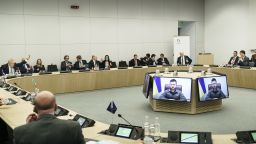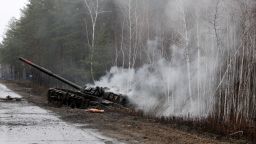Editor’s Note: Frida Ghitis, (@fridaghitis) a former CNN producer and correspondent, is a world affairs columnist. She is a weekly opinion contributor to CNN, a contributing columnist to The Washington Post and a columnist for World Politics Review. The views expressed in this commentary are her own. View more opinion on CNN.
President Joe Biden gave an impassioned, history-making speech, casting the war in Ukraine as part of an epochal struggle between democracy and autocracy. “This is the task of our time, the task of this generation.” It was the culmination of a trip in which he built up the West’s response to Russian President Vladimir Putin’s assault. He linked Putin’s attack on a democratic neighbor to events we have seen elsewhere, as “the forces of autocracy have revived all across the globe.” Strikingly, he concluded his speech declaring, “For God’s sake, this man [Putin] cannot remain in power!”
Biden’s mission in Europe this week had one overarching purpose: prevent Russian President Vladimir Putin from winning his war in Ukraine. And do it without triggering Putin’s worst instincts, which could turn the war in Ukraine into the prelude to something even more catastrophic. But Biden’s Warsaw speech showed he believes Putin’s defeat can reverse the autocratic tide washing across the world in recent years.

It’s a tightrope walk requiring exquisite balance. We will not know if Biden has succeeded immediately, but what is clear is that Biden is moving forward – something that cannot be said about Putin’s forces stuck in Ukraine. And as Biden explains his plan and enlists European support for it, his tone has been light on arrogance and unwavering in conviction.
For months, Biden has maintained that the right approach to handling this crisis is to bolster Ukraine’s defenses, rally America’s allies and the international community and call out Putin’s violations. He has done all this while trying to keep the United States and NATO out of direct combat with Russia.
Meanwhile, Putin’s military machine is bombing and killing civilians by the hundreds, striking hospitals and health care facilities, residential buildings and civilian shelters. The suffering of the Ukrainian people is unimaginable. But Putin, so far, is not achieving his objectives.
What Putin wanted was evident in a Russian state-owned news agency editorial declaring victory, published seemingly by accident and then quickly taken down. A few days after the war started, it announced that the West’s “global domination” is over, and “Ukraine has returned to Russia.” No such thing has happened.
The challenges for Biden and the West are not getting any easier. The worse Putin’s forces perform, the more dangerous the Russian leader becomes. Strongmen cannot survive if they look weak. Putin’s two decades in power were built on his brutal crushing of a rebellion in Chechnya – followed by other muscular displays at home and abroad. His very legitimacy depends on achieving victory.
Now, US intelligence believes a frustrated Putin may be planning to use chemical or biological weapons. Worse, the Kremlin’s spokesman refused to deny that Russia would use nuclear weapons if the nation faced an existential threat. But what exactly does that mean?
Remember, Louis XIV’s “L’etat, c’est moi” (“the state, it is me”)? Hyper-powerful dictators think they are the state. If Putin feels an existential threat against himself, how far would he go?
In meetings in Brussels with NATO, the G-7 and European Union officials, and later in Poland, where US troops are deployed near the Ukraine border, Biden built on his multi-pronged strategy – more and better weapons for Ukraine; stronger and larger military forces on NATO soil; tighter, more effective economic sanctions against Russia; and expanded support for Ukrainians fleeing the fighting. As the veteran writer George Will described it, Biden “has orchestrated a symphony of sanctions and weapons deliveries.”
The most recent instrument is a plan to wean Europe off Russian oil and gas, which as Biden said, Russia uses to “coerce and manipulate its neighbors” and to “drive his war machine.” Any US effort to help Europe reduce its dependence on Russia is not only right “from a moral standpoint,” he said, but “it’s going to put us on a stronger strategic footing.”
Of course, Biden could have said the same thing about the entire effort to defeat Russia’s campaign against Ukraine and the West.
Russia’s neighbors, those in and out of NATO, are justifiably nervous. Putin’s aim is almost cosmic. He wants to turn back time, restore former Soviet territories to Moscow’s control and reinstate Russia’s sphere of influence. His neighbors have experienced life under the Kremlin’s boot. They want to keep their independence.
For now, instead of capturing Ukraine, Russia is bogged down in what looks like a strategic disaster of historic proportions. Many of us warned Putin was miscalculating, that his plans could go awry. But one month is not a long time. Wars that appeared to be won in the early days were later lost (ask anyone who fought in Afghanistan, for the Soviets or later for NATO).
And yet, there’s something that is unquestionably going well for those who want to stop Putin. One month into the war, Russian forces are losing troops at a rapid pace and are struggling to maintain their gains in Ukraine.
The credit, above all, goes to Ukrainians; their fighters, their leaders – President Volodymyr Zelensky’s rallying of his nation and the international community – and everyday people who have worked to defend their country and support those who have left.
But Ukraine has been able to push back against one of the world’s biggest military forces in large part because it has received such massive resources from the West, led by the United States. It was US intelligence that displayed for the world Russia’s preparations to invade, and its designs to create a pretext for an attack. It is America, and its NATO allies, that have sent rivers of weapons to help Ukrainians strike their attackers. Ukraine needs more, of course, as Zelensky relentlessly, understandably, demands.
Biden’s strategy has not only helped in Ukraine’s defense, it has also helped turn this debacle into a geopolitical catastrophe for Putin by showing without ambiguity that Russia, led by a dictator, is clearly the aggressor against a fledgling democratic country trying to remain free.
American presidents have traveled to Europe for decades with the purpose – with one notorious exception – of touting the strength and unity of the Western alliance. This trip was different. Biden arrived during a raging war on the European continent, amid threats of nuclear attacks and with millions of refugees flooding out of Ukraine.
Striding gingerly, Biden showed the US is still, or again, the unquestioned leader of the free world. That very term, “free world,” which only recently seemed an anachronism, has now been revived by an aggressive Russian leader bent on restoring a fallen empire. His megalomania may well be thwarted with crucial help from an American President who remembers the old days well enough to know it has to be stopped.


